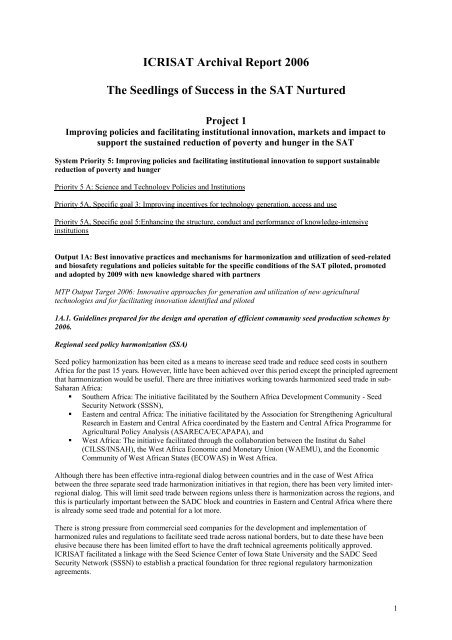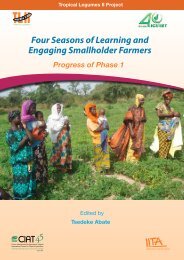ICRISAT Archival Report 2006 - The seedlings of success in the ...
ICRISAT Archival Report 2006 - The seedlings of success in the ...
ICRISAT Archival Report 2006 - The seedlings of success in the ...
Create successful ePaper yourself
Turn your PDF publications into a flip-book with our unique Google optimized e-Paper software.
<strong>ICRISAT</strong> <strong>Archival</strong> <strong>Report</strong> <strong>2006</strong><br />
<strong>The</strong> Seedl<strong>in</strong>gs <strong>of</strong> Success <strong>in</strong> <strong>the</strong> SAT Nurtured<br />
Project 1<br />
Improv<strong>in</strong>g policies and facilitat<strong>in</strong>g <strong>in</strong>stitutional <strong>in</strong>novation, markets and impact to<br />
support <strong>the</strong> susta<strong>in</strong>ed reduction <strong>of</strong> poverty and hunger <strong>in</strong> <strong>the</strong> SAT<br />
System Priority 5: Improv<strong>in</strong>g policies and facilitat<strong>in</strong>g <strong>in</strong>stitutional <strong>in</strong>novation to support susta<strong>in</strong>able<br />
reduction <strong>of</strong> poverty and hunger<br />
Priority 5 A: Science and Technology Policies and Institutions<br />
Priority 5A, Specific goal 3: Improv<strong>in</strong>g <strong>in</strong>centives for technology generation, access and use<br />
Priority 5A, Specific goal 5:Enhanc<strong>in</strong>g <strong>the</strong> structure, conduct and performance <strong>of</strong> knowledge-<strong>in</strong>tensive<br />
<strong>in</strong>stitutions<br />
Output 1A: Best <strong>in</strong>novative practices and mechanisms for harmonization and utilization <strong>of</strong> seed-related<br />
and biosafety regulations and policies suitable for <strong>the</strong> specific conditions <strong>of</strong> <strong>the</strong> SAT piloted, promoted<br />
and adopted by 2009 with new knowledge shared with partners<br />
MTP Output Target <strong>2006</strong>: Innovative approaches for generation and utilization <strong>of</strong> new agricultural<br />
technologies and for facilitat<strong>in</strong>g <strong>in</strong>novation identified and piloted<br />
1A.1. Guidel<strong>in</strong>es prepared for <strong>the</strong> design and operation <strong>of</strong> efficient community seed production schemes by<br />
<strong>2006</strong>.<br />
Regional seed policy harmonization (SSA)<br />
Seed policy harmonization has been cited as a means to <strong>in</strong>crease seed trade and reduce seed costs <strong>in</strong> sou<strong>the</strong>rn<br />
Africa for <strong>the</strong> past 15 years. However, little have been achieved over this period except <strong>the</strong> pr<strong>in</strong>cipled agreement<br />
that harmonization would be useful. <strong>The</strong>re are three <strong>in</strong>itiatives work<strong>in</strong>g towards harmonized seed trade <strong>in</strong> sub-<br />
Saharan Africa:<br />
• Sou<strong>the</strong>rn Africa: <strong>The</strong> <strong>in</strong>itiative facilitated by <strong>the</strong> Sou<strong>the</strong>rn Africa Development Community - Seed<br />
Security Network (SSSN),<br />
• Eastern and central Africa: <strong>The</strong> <strong>in</strong>itiative facilitated by <strong>the</strong> Association for Streng<strong>the</strong>n<strong>in</strong>g Agricultural<br />
Research <strong>in</strong> Eastern and Central Africa coord<strong>in</strong>ated by <strong>the</strong> Eastern and Central Africa Programme for<br />
Agricultural Policy Analysis (ASARECA/ECAPAPA), and<br />
• West Africa: <strong>The</strong> <strong>in</strong>itiative facilitated through <strong>the</strong> collaboration between <strong>the</strong> Institut du Sahel<br />
(CILSS/INSAH), <strong>the</strong> West Africa Economic and Monetary Union (WAEMU), and <strong>the</strong> Economic<br />
Community <strong>of</strong> West African States (ECOWAS) <strong>in</strong> West Africa.<br />
Although <strong>the</strong>re has been effective <strong>in</strong>tra-regional dialog between countries and <strong>in</strong> <strong>the</strong> case <strong>of</strong> West Africa<br />
between <strong>the</strong> three separate seed trade harmonization <strong>in</strong>itiatives <strong>in</strong> that region, <strong>the</strong>re has been very limited <strong>in</strong>terregional<br />
dialog. This will limit seed trade between regions unless <strong>the</strong>re is harmonization across <strong>the</strong> regions, and<br />
this is particularly important between <strong>the</strong> SADC block and countries <strong>in</strong> Eastern and Central Africa where <strong>the</strong>re<br />
is already some seed trade and potential for a lot more.<br />
<strong>The</strong>re is strong pressure from commercial seed companies for <strong>the</strong> development and implementation <strong>of</strong><br />
harmonized rules and regulations to facilitate seed trade across national borders, but to date <strong>the</strong>se have been<br />
elusive because <strong>the</strong>re has been limited effort to have <strong>the</strong> draft technical agreements politically approved.<br />
<strong>ICRISAT</strong> facilitated a l<strong>in</strong>kage with <strong>the</strong> Seed Science Center <strong>of</strong> Iowa State University and <strong>the</strong> SADC Seed<br />
Security Network (SSSN) to establish a practical foundation for three regional regulatory harmonization<br />
agreements.<br />
1

















